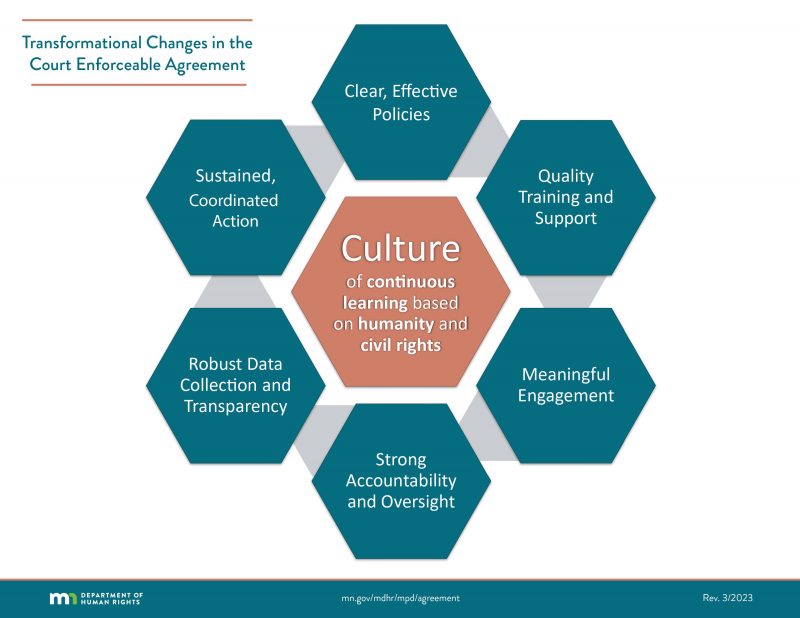
Short intro
On March 31, Mayor Jacob Frey announced the consent decree agreement between the City of Minneapolis and the Minnesota Department of Human Rights (MDHR). This agreement was the latest step towards atoning for the past bad actions of officers with a Minneapolis Police (MPD) badge.
The Background
May 25, 2020 – During an arrest for a suspected counterfeit $20 bill, two junior officers were sidelined by Derek Chauvin, a veteran MPD officer. The result was the death of George Floyd Jr. The actions of Chauvin that day showed the entire world what many non-white residents in Minneapolis had complained about for decades – there was a culture of police brutality against people of color.
June 25, 2021 – Derek Chauvin sentenced to 22.5 years in prison following his trial.
April 27, 2022 – The MDHR released the results of their investigations into race discrimination.
Summer 2022 – MNJC met with community members and officers to share their findings and recommendations.
Fall 2022 through March 2023 – Consent decree agreement discussions were held between the City of Minneapolis leadership and MDHR.
Following the death of George Floyd, it was obvious that changes needed to be made, not just in the Police Department, but across the public safety spectrum of Minneapolis. With the 2021 re-election of Mayor Jacob Frey, the current city structure with a Commissioner of Public Safety overseeing the multiple safety teams of Police, Fire, 911, etc. is now in place. Police Chief Brian O’Hara is leading a culture change in the MPD. Regarding Derek Chauvin, the Chief called him “a national embarrassment to the policing profession.”
With the decree announcement on March 31, the Mayor acknowledged the work of many people to get to the point of having a court-enforceable agreement. To read the full document, you can log into to mn.gov/mdhr/mpd/agreement/ and search for Community Engagement Consent Decree.
The consent decree was not done without the input of the many community members. The Minnesota Justice Research Center created a process of engaging groups to learn about the consent decree as it relates to the Minneapolis Police Department’s history of excessive force interactions aimed more often at people of color. Fifteen sessions were held from July-August 2022 to ensure the consent decree agreement would meet the concerns of the community.
You can read the full document by searching for Community Engagement: Shaping a Consent Decree in Minneapolis or go to mnjrc.org/our-work.
Key elements of the court-enforceable settlement agreement
Accountability, Oversight and Transparency:
- Creates a new MPD Review Panel, chaired by the Chief or their designee, to review, analyze, and assess MPD’s enforcement practices.
- The panel will review uses of force, traffic stops, pedestrian stops, discretionary searches, citations, and arrests to determine if they are tactically sound or reflect a need for policy change.
- Requires data collection during certain officer interactions to advance non-discriminatory policing.
- Directs significant investment to new IT infrastructure, including new data collection, management, and analysis systems to improve accountability, transparency, and public safety.
- Requires a new implementation unit within MPD to guide development of policies and training practices.
Other areas of focus are Use of Force, Officer Wellness, Training, Community Engagement, and Stops, Searches, and Seizures.
From minneapolismn.gov/news/2023/march/settlement-agreement/


